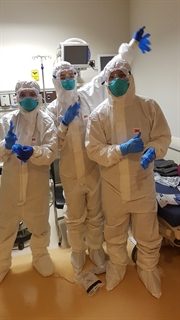My responsibilities change drastically at the early start of the COVID-19 outbreak. It was in the beginning of January 2020 when I heard the news about COVID-19. I was confident that our facility was ready to face the battle as we have in-placed policies and procedures and annual drill or exercise of sudden influx of emerging and re-emerging Infectious disease, but oh boy, I was wrong. Despite years of hard work that outlined almost exactly what an outbreak would look like and how to mitigate its impact. And yet no one was truly prepared in a pandemic state.
Our facility was able to implement the disaster plans which led us to have early identification of the 2nd laboratory confirmed COVID-19 case in the United Arab Emirates. My primary role as an Infection Control Nurse shifts to hospital preparedness and response to potential cases including contact tracing. I was on call 24/7.
The greatest success in implementing our strict COVID-19 guidance is that, we were able to contain the virus without single hospital acquired infection of COVID-19 either to patients or staff from the start of the pandemic until I left the facility to venture and join the Infection Preventionists in the United States of America. Although the healthcare systems of each country are different, the basics of Infection Control are the same.
The most challenging aspect is the ever-changing guidelines from the CDC and other agencies. While those guidelines are necessary to ensure the safety of our healthcare workers, they can create obstacles for leaders and are often stressful for the entire healthcare team. Furthermore, we must often tackle protocols that change overnight, sometimes multiple times a day. This involves reeducating and disseminating information to more than 800 employees in a very short period of time. As an example, our facility organized in-services for staff regarding the level of personal protective equipment (PPE) required to care for suspected or confirmed COVID-19 cases. As soon as our staff were able to complete the education, we had to inform them about the updated guidelines. It can be hard for staff to accept such changes because reverting to a lower level of protection can leave people feeling unprotected. Our team's credibility as infection preventionists may even be questioned. But because of my certification as a Board Certified in Infection Control and Epidemiology, people listen and believe in my capacity to guide them during this crisis. Attaining the CIC was not easy. At first, I began taking online courses through the Association for Professionals in Infection Control (APIC) and the Society for Healthcare Epidemiology of America (SHEA). As I have continued to evolve in the IP position, I’ve also taken an ample number of seminars, training and conferences. After a few years as an experienced IP, and after dozens of webinars, courses, and firsthand experiences, I passed the Certification Board of Infection Control and Epidemiology (CBIC) comprehensive exam to earn the certification in infection control (CIC) designation. “As I continue to learn and strive my best in the challenging field of my profession, I strongly believe that being certified is an everyday commitment in Infection Prevention and Control.”

